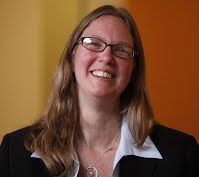Erica Mackie and GRID Alternatives
 This month, WEN had the opportunity to learn more about the non-profit GRID Alternatives through an interview with its CEO and Co-Founder, Erica Mackie. Erica co-founded GRID Alternatives with Tim Sears in 2001 and has helped develop it into a major national non-profit. For her leadership of GRID Alternatives, Ms. Mackie has received numerous awards including the Governor’s Environmental and Economic Leadership Award in 2008, the New Leaders Council Energy Leadership Award in 2009, the James Irvine Foundation Leadership Award in 2010, the US Green Building Council’s Green Building Super Hero Award in 2010 and the 2013 Clean Energy and Empowerment Award from C3E. Ms. Mackie’s professional experience prior to GRID Alternatives included work in the social sector first with survivors of domestic violence and then with youth at risk, as well as work in renewable energy and energy efficiency consulting and sales. She holds two bachelor’s degrees from Southern Illinois University, one in Mechanical Engineering and the other in Physics.
This month, WEN had the opportunity to learn more about the non-profit GRID Alternatives through an interview with its CEO and Co-Founder, Erica Mackie. Erica co-founded GRID Alternatives with Tim Sears in 2001 and has helped develop it into a major national non-profit. For her leadership of GRID Alternatives, Ms. Mackie has received numerous awards including the Governor’s Environmental and Economic Leadership Award in 2008, the New Leaders Council Energy Leadership Award in 2009, the James Irvine Foundation Leadership Award in 2010, the US Green Building Council’s Green Building Super Hero Award in 2010 and the 2013 Clean Energy and Empowerment Award from C3E. Ms. Mackie’s professional experience prior to GRID Alternatives included work in the social sector first with survivors of domestic violence and then with youth at risk, as well as work in renewable energy and energy efficiency consulting and sales. She holds two bachelor’s degrees from Southern Illinois University, one in Mechanical Engineering and the other in Physics.
What is the mission of GRID Alternatives?
GRID Alternatives vision is a successful transition to clean, renewable energy that includes everyone. Our mission is to make renewable energy technology and job training accessible to underserved communities. We bring together community partners, volunteers and job trainees to implement solar power and energy efficiency for low-income families, providing energy cost savings, valuable hands-on experience, and a source of clean, local energy that benefits us all.
What is the history of Grid Alternatives?
Tim and I founded GRID Alternatives during the 2001 California energy crisis. We were engineering professionals who were implementing large-scale renewable energy and energy efficiency projects for the private sector, and found ourselves wondering why this amazing technology could save corporate clients millions of dollars but was out of reach for people like my neighbor in Oakland who could barely pay her bills. Through GRID Alternatives, we developed a model to make solar technology and training practical and accessible for low-income communities that need the savings and jobs the most, yet have the least access.
In 2008, GRID Alternatives was selected by the California Public Utilities Commission to serve as the statewide program manager for its Single-family Affordable Solar Homes (SASH) incentive program, the country’s first dedicated solar rebate for low-income families. Nearly 4000 California homeowners have gone solar through GRID Alternatives under this groundbreaking initiative, and we have integrated workforce development into every project.
In 2012, GRID Alternatives launched a national expansion with support from Wells Fargo. We began serving Colorado in fall, 2012, and the New York Tri-state area in 2013. In 2014, GRID Alternatives started an international program in Nicaragua through the acquisition of Power to the People, as well as a program to serve Tribal communities across the nation. We will be expanding to serve the Mid-Atlantic region this coming fall.
What is the Women in Solar initiative?
The National Women in Solar Initiative is a year-long campaign, in partnership with SunEdison, to bring more women into the solar industry and support their professional advancement. It includes targeted outreach to bring more women out onto rooftops to get installation and leadership training with GRID Alternatives; women-only installation events; mentoring and networking opportunities; 20 year-long fellowships through GRID Alternatives’ SolarCorps program; and a series of webinars featuring women in various solar careers.
Why the focus on women?
The U.S. solar market grew at a rate of 41% last year. In order to sustain this rapid growth, the industry needs to attract and retain talented professionals at all levels, from installers to salespeople to executives. Just one in five solar workers today are women. Attracting more women to the industry will increase the talent pool and add important perspectives as solar becomes more mainstream. GRID Alternatives’ volunteer model provides women a pathway to access a variety of careers in the industry, and our partnerships with so many solar companies puts us in a great position to support hiring, professional development and networking. Just a few months in to the initiative we’ve gotten a great response. We are already feeling a shift in attention and approach toward the issue by solar companies both large and small.
